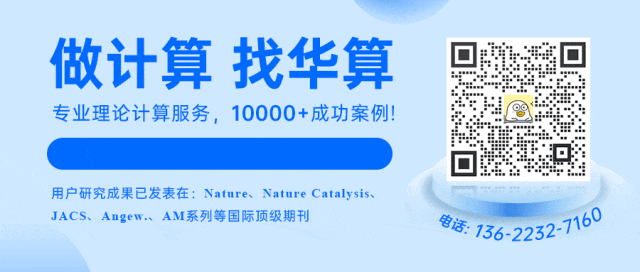
【做计算 找华算】理论计算助攻顶刊,10000+成功案例,全职海归技术团队、正版商业软件版权!
经费预存选华算,高至15%预存!
1, One-year visiting opportunity supported by the CSC Scholarship, at Uppsala University in Sweden.Develop streamlined computational methods and machine learning (ML) models to aid in designing cost-effective catalysts and devices for electrochemical ammonia production.The long-term target is to develop computational strategies for discovering novel and economic electrocatalysts that exhibit high catalytic reactivity and selectivity comparable to that of enzymes. To achieve this aim, we will establish streamlined computational approaches that will enhance the in-depth mechanistic understanding of electrocatalysts, and develop predictive ML models for the new design.Research background in computational chemistry, inorganic and redox chemistry.
Solid knowledge of computational methods (DFT, MD) and skills in applying software (Gaussian, Gromacs, Vasp, Amber, etc.); proficiency in machine learning and Python are advantageous.
Independent research ability, and strong English writing/speaking skills.
Ability to collaborate and work equally with colleagues of different nationalities, cultures, and beliefs in a friendly manner.
Weekly group meeting, one-to-one discussions, and comprehensive guidance from mentors.
Fika/Coffee break every Friday.
Diverse seminars and training courses organized by the Department.
Equality, respect, and a harmonious atmosphere with daily activities and parties in the research program and the Department.
Eligible students can apply for financial support under the CSC scholarship.
Free daily coffee, fruit, and milk in the office.
The research group follows an 8-hour work system, a two-day weekend, and observes all legal holidays.
Enjoy free medical care, free education for children, maternity benefits, and other welfare benefits in Sweden.
Free attendance at courses organized in Sweden.
2, Visiting researcher grants Wennergren Foundation offers tax-free scholarships for foreign senior researchers to work in Sweden. The senior researcher must have completed the doctoral degree earlier than five years before the time of application. The scholarships are granted for 1 - 12 months, starting during the calendar half-year (July 1 alt. January 1) that follows closest to the time of application.No later than 10 March at 23:59 or 1 October at 23:59.Content of the application:The application should include: The planned research project (no more than 5 pages, incl. references); The guest researcher's education and skills; and The importance of the visiting researcher for the applicant/host institution. The application must also contain the visiting professor's curriculum vitae and list of 10 selected publications, as well as the principal's CV (short version) and list of 10 selected publications.
For more information, please visit the webpage:https://www.swgc.org/gastforskarstipendier.aspxProf. Marcus Lundberg, Uppsala University, Department of Chemistry – Ångström. Group website:https://www.kemi.uu.se/angstrom/research/molecular-biomimetics/biophysical-bioinorganic-chemistry/lundberg-groupThe research group is located in the Molecular Biomimetics research program at the Department of Chemistry – Ångström, which is focused on photosynthetic water oxidation, artificial photosynthesis, ammonia production, bioinorganic chemistry, electrochemistry and computational methods. The department organizes the Swedish Consortium for Artificial Photosynthesis (CAP) centre which is based on close, cross-disciplinary collaboration among ca. 80 researchers specializing in the areas of molecular biology, biochemistry, synthetic chemistry, and physical chemistry for green energy production. The CAP environment at Uppsala University has been ranked as “worldleading” in the Uppsala University evaluation “KoF2011”, and in “KoF2017”.Researchers in Computational Chemistry in the Molecular Biomimetics research program include Prof. Marcus Lundberg, Prof. Nessima Salhi, Dr Meiyuan Guo, and Dr. Shaoqi Zhan. Research interests include:1. Develop computational methods/protocols and machine learning (ML) models for novel catalyst design.2, Develop approaches to interpret X-ray spectra of transition-metal catalysts.3. Understand the mechanisms of reaction processes of relevance to sustainable agriculture and environment, and renewable energy conversion.4. Model enzymatic and biomimetic reactions to inspire the development of new efficient catalysts.If you are enthusiastic about contributing to cutting-edge research, please send your application with resumes and cover letters to:Email: marcus.lundberg@kemi.uu.se; shaoqi.zhan@kemi.uu.se【做计算 找华算】华算科技专注DFT代算服务、正版商业软件版权、全职海归计算团队,10000+成功案例!客户成果发表在Nature、Nature Catalysis、JACS、Angew.、AM、AEM、AFM等顶刊,好评如潮,专业靠谱!